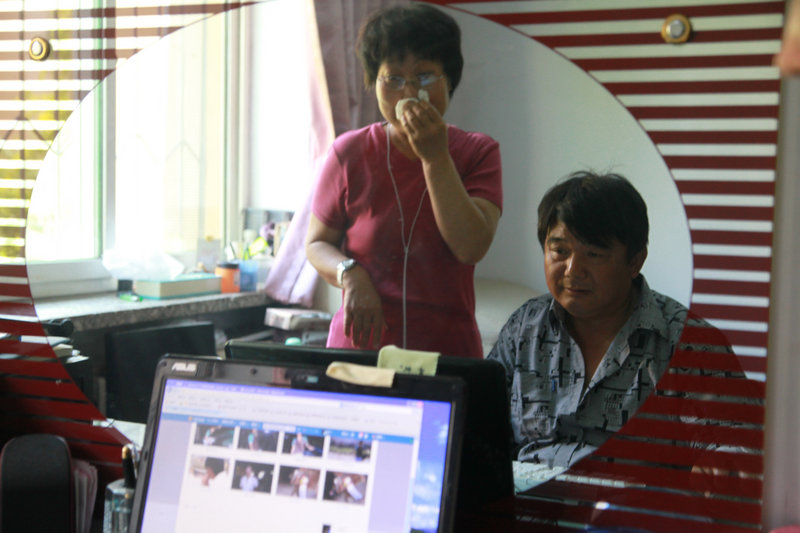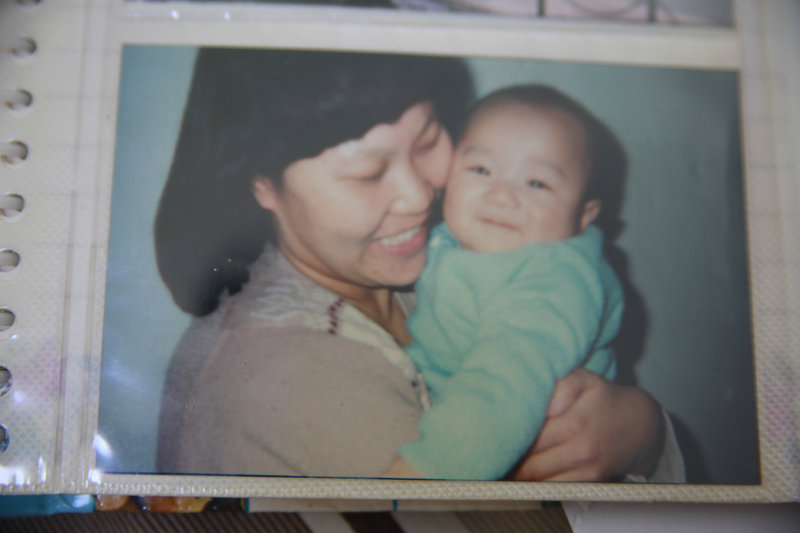PANJIN, China – It’s been 11 months, and Xu Min still rarely leaves the house.
He spends his days on the couch in front of a TV, trying to block out memories of his dead son. He blames fate for the car accident that killed the 23-year-old last September.
But for the loneliness that will haunt him and his wife the rest of their lives, Xu blames the Chinese government.
China told the couple they could only have one child and threatened to take away everything if they didn’t listen. They were good citizens, he said, “so for 20 years, we put our whole future and hope into our son.”
Now, they have no one to support them in old age. But even more crushing, said Xu, 53, they have nothing to live for.
For more than three decades, debate has raged over China’s one-child policy, imposed in 1979 to rein in runaway population growth. It has reshaped Chinese society — with birthrates plunging from 4.77 children per woman in the early 1970s to 1.64 in 2011, according to United Nations estimates — and created the world’s most imbalanced gender ratio, with baby boys far outnumbering girls.
Human rights groups have exposed forced abortions, infanticide and involuntary sterilizations, practices banned in theory by the government. And officials are increasingly deliberating whether the long-term economic costs of the policy — including a looming labor shortage — now outweigh the benefits.
In the latest sign of such concern, the government announced last weekend that it is studying possible ways to relax the one-child policy in coming years, according to state media.
Little discussed and largely ignored, however, is a quiet devastation left in the policy’s wake: childless parents. A parent’s worst nightmare in any country, the deaths of children in China are even more painful because of the cultural importance of descendants, increasing financial pressures on the elderly and the legal limits on bearing additional offspring.
Few reliable numbers exist on such grieving parents. But one study at the state-run Chinese Academy of Social Science estimated there are already more than 1 million parents who lost their only child, a number expected to rise rapidly.
Many such parents are too old to conceive again, and some say they regret not pushing for a second child when they could have, even if it would have meant losing their jobs and getting hit with overwhelming fines.
In quiet and often tearful interviews, more than 30 parents who lost children described lives of emptiness and a depression so deep that some thought about suicide. Almost all characterized their child’s death as a crippling financial blow because of how strongly China’s elderly tend to depend on their children to supplement modest government pensions.
Many noted bitterly the enormous resources the government has plowed into one-child enforcement, creating an entire new wing of bureaucracy down to the township level. The policy has limited exceptions for rural and ethnic groups.
The government collects steep fines from offenders, each year estimated to be in the billions, although the precise amount is kept secret. And yet, the parents complain, it wasn’t until 2007 that China began to disburse small sums as compensation to families whose only child had died.
TRYING TO AVOID SHAME
Equally difficult, many parents say, is their private struggle with shame. One of the gravest insults in Chinese is to curse someone to die “duanzi, juesun” — childless, without descendants.
Xu and his wife rarely leave their cramped apartment in Panjin, an oil town in northeastern China, for fear strangers will bring up the topic of children. They have tapered off contact with family and friends, finding their pity just as painful. Some friends suggested they pretend their son, Xu Zijie, had moved abroad or was too busy with work to visit. Others seemed to avoid them.
“They view us as bad fortune and worry our bad luck will transfer to them. I can’t say I blame them,” Xu said.
Xu’s wife, 51, who asked that her name not be published so that she could talk freely about her shame, recalled through tears the joy they felt years ago at their son’s birth.
A second child was so unthinkable that, immediately after her delivery, doctors performed a procedure to prevent her from being able to conceive.
Because Xu and his wife worked at an oil company owned by the government, as most enterprises were then, having a second child would have meant losing not just their jobs but housing, health care and schooling for the children. They would have faced a fine of more than five times their province’s annual average income.
With just one child to care for, Xu said, “We didn’t live for anything any more, only for him.”
Xu’s wife quit her job and moved into a small second apartment near her son’s high school just so she could feed him healthier breakfasts and lunches than what was offered in the school cafeteria.
By the time Zijie was approaching college graduation, Xu said, Xu had already lined up a coveted job for him at the oil company. Then came the accident that sent their son tumbling out a loose car door to his death.
SHARING LEADS TO PROTEST
After months of deep depression, his parents began searching for a new reason to live. They begged doctors in vain, Xu said, hoping to find some way to have another baby. They considered adoption — extremely uncommon among Chinese for cultural reasons — and ultimately rejected it. “Blood relations are just too important for many Chinese,” Xu said.
The only solace came from online forums created by other bereaved one-child parents. The conversations online often broached topics impossible to discuss elsewhere — about parents’ haunting dreams of their children, the struggle to get one’s wife through mother’s day, the anger at the government.
Eventually, online talk turned to protest, and hundreds joined a sit-in in front of China’s Family Planning Commission headquarters in Beijing to demand greater compensation. Leading up to the May event, many said, they received threatening phone calls from authorities. Groups of 20 to 30 people were intercepted by sometimes brutal police at train stations..
Many interviewed on the day of the protest said they actually supported the one-child policy – as do a majority of Chinese, according to a 2008 Pew Research Center survey.
“China’s economy would not have risen as fast if there were too many mouths to feed,” said Niu Binghai, 48, a taxi driver from Wuhan whose son died recently at age 22. “But it was built on our sacrifice for the country. Why can’t our country love us back?”
In the end, health officials met with representatives from the protest and convinced the crowd to go home on vague promises of better access to nursing homes, housing, medical care and higher subsidies at some point — the same things they’d said during two earlier protests.
Copy the Story Link
Send questions/comments to the editors.




Success. Please wait for the page to reload. If the page does not reload within 5 seconds, please refresh the page.
Enter your email and password to access comments.
Hi, to comment on stories you must . This profile is in addition to your subscription and website login.
Already have a commenting profile? .
Invalid username/password.
Please check your email to confirm and complete your registration.
Only subscribers are eligible to post comments. Please subscribe or login first for digital access. Here’s why.
Use the form below to reset your password. When you've submitted your account email, we will send an email with a reset code.